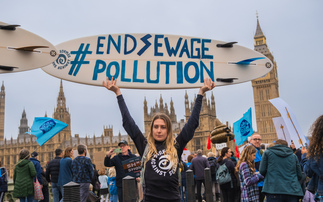UN advisor urges negotiators to make action on climate change a "headline" part of new sustainable development goals
The next 18 months could "reset" the direction of the global economy and put it on a sustainable path that avoids the worst impacts of climate change, but only if political and business leaders take bold steps to deliver a new wave of clean technology development.
That was the stark warning issued by leading US economist and UN advisor Professor Jeffrey Sachs yesterday as he told the New Environmentalism Summit in Brussels that the deployment of clean technologies was urgently required to redirect the "juggernaut" that is the fossil fuel powered global economy.
Sachs said the world now had access to technology that could create smart energy systems, clean energy, energy efficiency and a circular economy, but warned that the global economy remains a "a juggernaut that keeps using this old [fossil fuel] technology".
He added that average economic growth rates of 3.5 per cent per annum meant the global economy doubled every 20 years and that, while this helped to lift people out of poverty, it was also putting intense pressure on natural resources, habitats and the climate.
"Soaring population and economic growth that relies on technologies that were invented 200 years ago in the form of the steam engine means we are pushing up against our planetary boundaries," Sachs said, adding that in April, for the first time in 300,000 years of human history, CO2 concentrations in the atmosphere passed 400 parts per million. "Climate change is no longer a threat in the future. It is happening now. It is a clear and present danger."
However, Sachs argued that there were a number of reasons for environmentalists to be optimistic, highlighting the potential for policy and technology progress. "We have two opportunities to reset the direction in the next 18 months," he said, referring to the UN plan to agree new Sustainable Development Goals (SDGs) in September 2015, which is scheduled to be followed by a new climate agreement at next year's Paris Summit.
Sachs, who advises the UN on development policy, issued a plea for negotiators to draw the obvious connections between the two parallel talks. "Climate change needs to be a headline in those SDGs," he said. "We have to tackle climate change if we are to have any hope of tackling poverty."
He also argued that there was a growing cause for optimism in the run up to the UN climate summit in Paris, particularly following the announcement this week of a new strategy for tackling US power plant emissions.
He warned that the targets represented only a first step towards decarbonisation, but argued that the Obama administration's decision to give states flexibility in establishing a plan to cut power sector emissions, coupled with the EU's focus on national emissions reduction strategies, could provide a template for a successful global climate agreement.
"I believe we have the makings of an agreement between the US, EU and China, and then the rest of the world would breathe a sigh of relief that [those big emitters] have agreed to deep decarbonisation," he said.
Sachs explained that any new agreement had to recognise the value of setting clearly defined targets and a pathway for achieving them. He quoted President Kennedy's famous comments on nuclear disarmament - "by defining our goal more clearly - by making it seem more manageable and less remote - we can help all people to see it, to draw hope from it and to move irresistibly towards it" - and argued that a similar approach was required for tackling climate change.
"We must define our goals for sustainable development and climate safety more clearly and show that they are manageable," Sachs said, adding that the current business as usual pathway would be "devastating".
Specifically, he said that major economies needed to establish a practical, manageable pathway for "deep decarbonisation" that would deliver zero net emissions in the second half of the century.
He predicted this pathway would be based on a massive improvement in energy efficiency, low or zero carbon electricity, fuel switching towards electric transport, and net biological sequestration of carbon emissions through reforestation.
Sachs said there were encouraging signs that the technologies already existed to deliver much of this decarbonisation, particularly highlighting how the cost of solar power has fallen from $76 a watt in 1977 to $0.74 a watt last year - a phenomenon he said meant the world could "envisage max electrification of rural communities".
However, he also warned that, while the world was still in the midst of a technological wave delivered by the IT industry, a new wave of sustainable technology was urgently needed.
Separately, Achim Steiner, of the UN Environment Programme, told the conference that, while the environmental movement faced daunting challenges, it should recognise the success it has enjoyed to date.
"It has been just 25 years between us starting to really understand climate change and having a process under way to rethink the entire economy," he said. "Twenty-five years to go from a phenomenon being identified to having a programme in place to change our energy and transport systems... It is not time to relax, but nor is it time to reject the environmentalism that has delivered this progress."
He also highlighted how 12 per cent of land was now under some form of environmental protection, revealed that the UNEP headquarters was now generating more solar power than it could use on site, and detailed how clean technologies had enjoyed rapid adoption rates which suggest that they can break into the mainstream.
"In less than 12 years we have moved from a point where renewables were nowhere, to a point where last year more was invested in renewables than in fossil fuels," he said. "In less than a decade and a half we have gone from identifying the problem, to developing the technology, and now to large scale deployment."
He argued that this technological progress could herald a new era for environmentalism that does not downplay environmental challenges, but is focused more on the solutions at hand. "The question people ask is whether we have the solutions [to climate change]," he said. "Maybe our focus now has to be on not articulating the problem, but articulating the solution."
His optimism was echoed by Janez Potočnik, European Commissioner for Environment, who argued that a shift in business and political governance models to focus more on long-term goals could successfully tackle the world's environmental challenges.
"As a 'new environmentalist' I believe that there is reason for hope, because basically the path to economic wellbeing and environmental sustainability are the same," he said. "Why am I hopeful? Because of our capacity for creativity and innovation, and because so many of the inefficiencies that we see all around us today can so obviously be tackled by channelling that creativity and innovation."
He highlighted how there were numerous inefficiencies locked into our current infrastructure that could be addressed, such as the fact that turning coal into light is only three per cent efficient or the manner in which "only 15 per cent of the energy you put in your petrol tank is used to actually move your car down the road".
"Just as in the face of rising labour prices we made miraculous increases in labour productivity, I believe that in the face of resource scarcities and rising prices we will be able to perform miracles in raising resource productivity," he added.
However, Potočnik warned that a green industrial revolution will be possible only if politicians, civil society and businesses work together to drive the development of innovative new technologies and economic models.
"We absolutely need environmental lobbying. We need NGOs and individuals who will bring direct action to the streets and to the wilderness. We need awareness raising campaigns, petitions and protests," he said.
"The 'old' environmentalism is certainly not dead. It is not even remotely redundant. But to succeed, it needs to be accompanied by a 'new' environmentalism which aims at harnessing the power of business and government and turning them in the right direction. Old and New Environmentalism need to go hand in hand in the same way that the economy and the environment need to go hand in hand."










